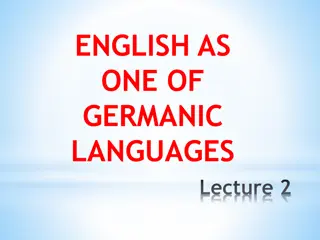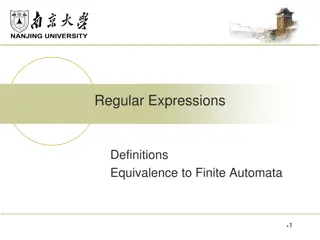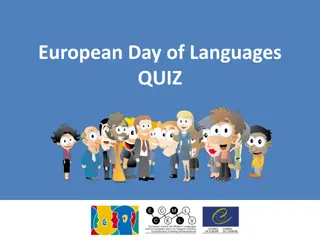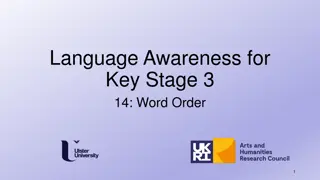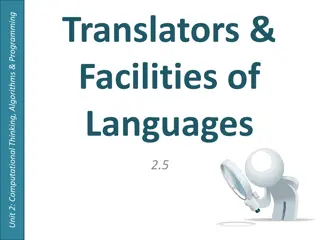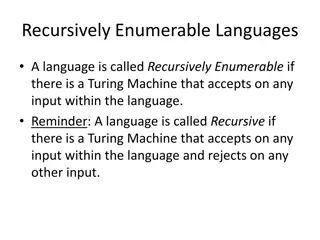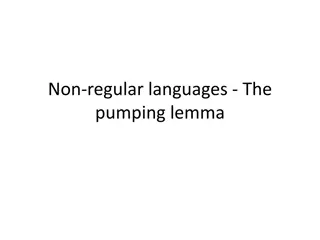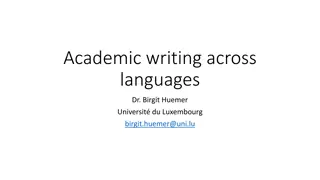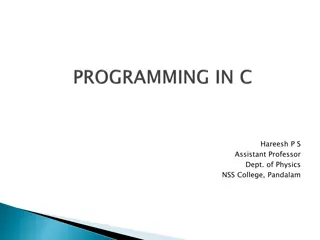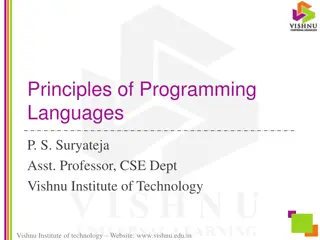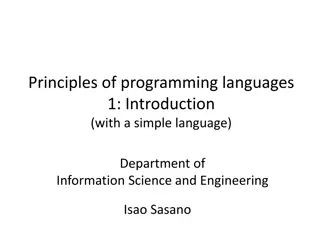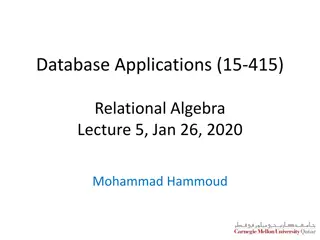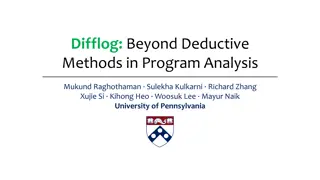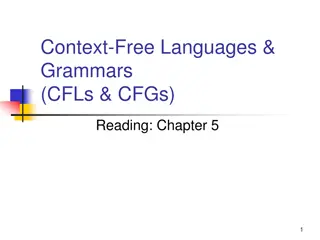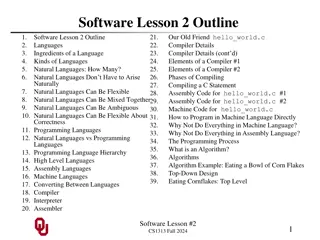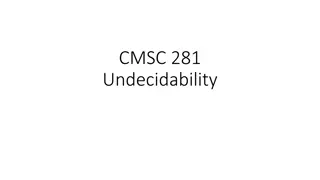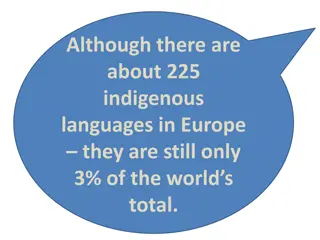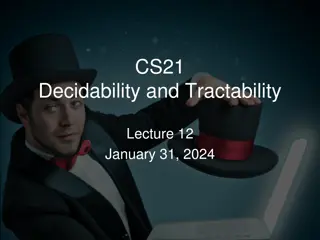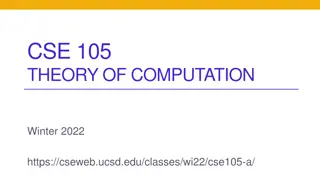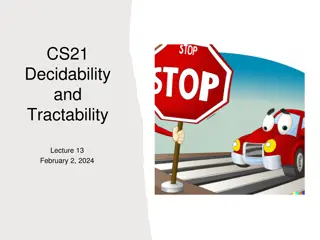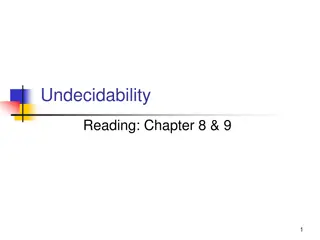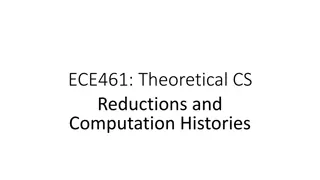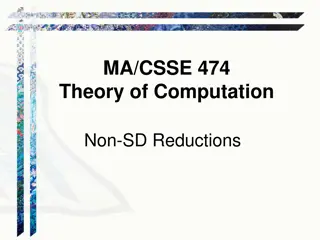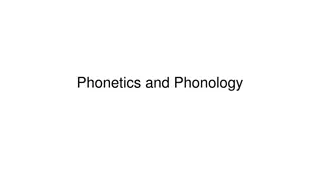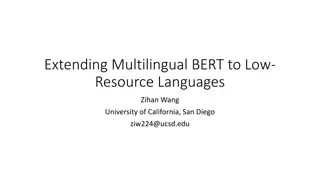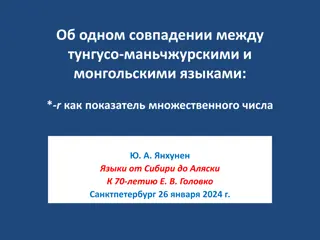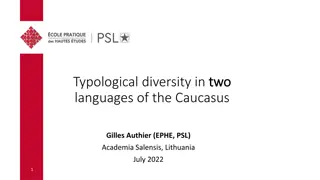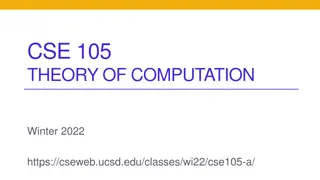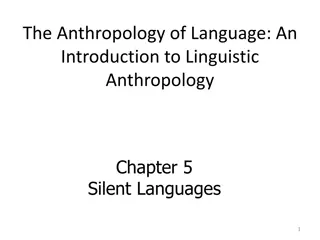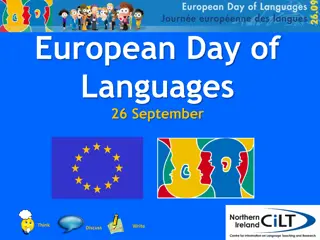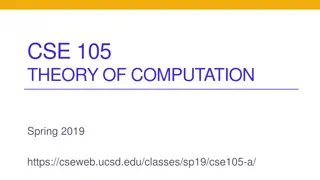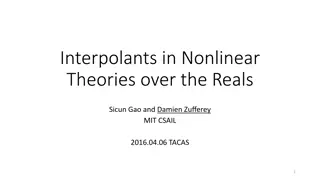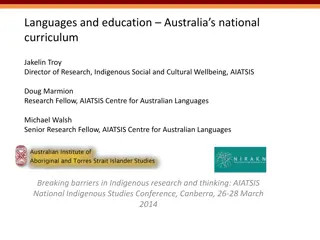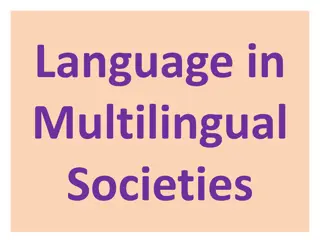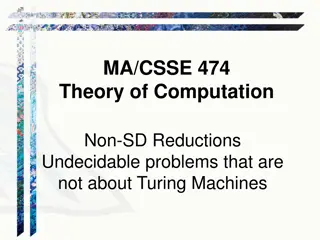Exploring Germanic Tribes and Languages in History
Delve into the ancient Germanic tribes and languages, their territories, movements during the Migration Period, surviving languages, writing systems, and encounters with prominent historical figures like Roman generals. Learn about the earliest mentions of Germans by Greek travelers and astronomers,
3 views • 35 slides
SS6G11 A DIVERSITY OF EUROPEAN LANGUAGES.
Discover the rich variety of European languages through a comparison of German, English, Russian, French, and Italian. Explore the importance of language diversity, unique cultural characteristics, and the distribution of languages across Europe. Uncover fascinating insights into how language shapes
5 views • 22 slides
Introduction to Regular Expressions and Equivalence to Finite Automata
Regular expressions (REs) are used to describe languages by algebra and are equivalent to finite automata. They define regular languages precisely using operations like union, concatenation, and Kleene star. The concatenation of languages combines strings from two languages, while the Kleene star re
9 views • 106 slides
European Day of Languages QUIZ
Explore interesting facts about languages in the world through a quiz. Discover the number of living languages, the origins of written language, official languages like Azeri, and the history of sign languages. Test your knowledge on the European Day of Languages!
6 views • 24 slides
Understanding Word Order in Different Languages
Explore the fascinating world of word order in languages. Discover how different languages arrange words in various ways, such as Subject-Verb-Object (SVO), Subject-Object-Verb (SOV), and more. Delve into the diversity of word orders for subjects, objects, and verbs, and uncover how language structu
2 views • 31 slides
Understanding Programming Languages and Translators in Computational Thinking
Programming languages are categorized into generations, from low-level machine code to high-level languages. Translators like assemblers, compilers, and interpreters help convert code for computer execution. Each generation has its characteristics and purposes, affecting ease of programming, debuggi
1 views • 18 slides
Understanding Recursive vs Recursively Enumerable Languages
Comparison between recursive and recursively enumerable languages in terms of Turing Machines acceptance, decidable languages, recognizable languages, and partial predicates. Explains the concepts with examples and how Turing Machines decide membership in languages.
0 views • 8 slides
Understanding Non-Regular Languages and the Pumping Lemma
Dive into the world of regular and non-regular languages, exploring the concept of the pumping lemma. Learn about different types of non-regular languages and why some languages require an infinite number of states to be represented by a finite automaton. Find out why mathematical proofs are essenti
0 views • 62 slides
Understanding Academic Writing Across Languages: Challenges and Solutions
Explore the historical development of languages in academia and science, equivalence issues, written academic genres, evolution from Latin to national academic languages, and the importance of a common language in academia. Dive into the specialized text structures, syntax, idiomatic phrases, and pr
0 views • 29 slides
Overview of Grammar Types and Chomsky Hierarchy
The four types of grammars are General, Context-Sensitive, Context-Free, and Linear grammars, each recognizing a specific set of languages. Chomsky Hierarchy categorizes these grammars into four levels, indicating subsets of languages they can recognize. Context-free grammars have specific productio
0 views • 17 slides
Understanding Formal Semantics of Programming Languages: From Lambda Calculus to Separation Logic
Explore the foundational concepts of formal semantics in programming languages, covering Lambda Calculus, Untyped and Simply-typed languages, Imperative languages, Operational and Hoare logics, as well as Separation logic. Delve into syntax, reduction rules, typing rules, and operational semantics i
7 views • 14 slides
Understanding Programming Languages: Levels and Basics
Programming languages facilitate communication between humans and computers, with machine language being the fundamental binary code understood by computers. Different levels of programming languages exist, from low-level machine language to high-level languages like C. Natural languages are meant f
0 views • 35 slides
Principles of Programming Languages at Vishnu Institute of Technology
Introduction to Principles of Programming Languages course including prerequisites, objectives, outcomes, and syllabus at Vishnu Institute of Technology. The course covers key concepts, popular programming paradigms and languages, practical knowledge in lexical analysis and parsing, as well as writi
0 views • 43 slides
The Currency of Love: Importance of Communication and the 5 Languages of Love
Understanding the essence of love lies in effective communication and expressing love through the five languages - Words, Gifts, Actions, Time, and Physical Touching. Communication is depicted as the currency of love, essential for deepening bonds between partners. Gary Chapman's concept of the 5 La
4 views • 33 slides
Principles of Programming Languages: Introduction and Machine Language Overview
This material covers the basics of programming languages, including an introduction to a simple language, evaluation methods, and contact information for the instructor. It explains machine language, the native language of computers, and the transition to high-level programming languages. The benefi
0 views • 24 slides
Understanding Relational Query Languages in Database Applications
In this lecture, Mohammad Hammoud discusses the importance of relational query languages (QLs) in manipulating and retrieving data in databases. He covers the strong formal foundation of QLs, their distinction from programming languages, and their effectiveness for accessing large datasets. The sess
0 views • 39 slides
Advancements in Program Analysis Beyond Deductive Methods
Explore the evolution of program analysis beyond deductive methods with innovative tools like static analyzers and data-driven analysis design. Discover the challenges faced, such as undecidable analysis questions and scalability issues, and the strategies employed to address them. Learn about the s
0 views • 24 slides
Understanding Context-Free Languages and Grammars
Context-Free Languages and Grammars (CFLs & CFGs) are essential in theoretical computer science, providing a framework for recognizing non-regular languages. This content explores the distinction between regular and context-free languages, delves into the construction of language recognizers using c
0 views • 40 slides
Understanding Languages in Software Development
Exploring the fundamentals of languages in software development, this content covers natural languages, programming languages, and the components of a language like symbols, grammar, and semantics. It delves into the differences between natural and programming languages, highlighting the essential r
0 views • 39 slides
Understanding the Limits of Computation in CMSC.281 Undecidability
Exploring the concept of undecidability in computing, we delve into the question of whether there are tasks that cannot be computed. The journey leads us to the theorem that the language ATM, defined as containing Turing Machine descriptions accepting input strings, is undecidable, showcasing the fu
0 views • 14 slides
The Diversity of European Languages
Europe is home to a rich tapestry of languages, with over 225 indigenous languages spoken, making up only 3% of the world's total. Bilingualism is celebrated for its benefits, facilitating communication, enhancing cognitive abilities, and fostering cultural connections. Despite many languages having
0 views • 14 slides
Understanding the Halting Problem in CS Theory
Delve into the intricacies of the Halting Problem and its undecidability in computer science theory. Learn about the concepts of decidable and undecidable languages, the implications of the Halting Problem on computing, and explore the proof that demonstrates the undecidability of HALT.
0 views • 24 slides
Theory of Computation Winter 2022: Learning Goals and Key Concepts
Explore the key concepts in the Theory of Computation for Winter 2022, including decision problems, reductions, undecidability, and the relationship between HALTTM and ATM. Learn about decidable, recognizable, and undecidable problems as well as the importance of reductions in proving undecidability
0 views • 27 slides
Understanding Reductions in Decidability and Tractability
Exploring the concepts of reductions, particularly many-one reductions, in the context of decidability and tractability. The lecture delves into the relationship between decidable and undecidable problems, highlighting examples like Rice's Theorem. It explains the definitions and implications of red
0 views • 20 slides
Understanding Recursive and Recursively Enumerable Languages
Exploring the concepts of decidability and undecidability in computer science, specifically focusing on Recursive and Recursively Enumerable (RE) languages. Recursive languages always halt, while RE languages may or may not halt, showcasing the differences between decidable and undecidable problems.
0 views • 35 slides
Understanding Reductions in Theoretical Computer Science
Explore the concept of reductions in theoretical computer science, where problems are converted into others allowing solutions to one to solve the other. Learn how reductions can prove languages to be undecidable using examples like ATM and HALTTM. Follow along as we discuss the application of reduc
0 views • 38 slides
Understanding Non-SD Languages in Theory of Computation
Explore the concept of Non-SD languages in the theory of computation, which are larger in number compared to SD languages. Non-SD languages involve infinite search or analyzing whether a Turing Machine will loop indefinitely. Discover examples and insights into proving languages are not SD through c
0 views • 38 slides
Understanding Phonology: The Study of Speech Sounds in Language
Phonology is a branch of linguistics that focuses on the organization and usage of speech sounds in natural languages, with phonemes being the smallest units of sound that carry meaning. This field explores the sound structure of languages, highlighting the variety of phonemes present across differe
0 views • 19 slides
Extending Multilingual BERT to Low-Resource Languages
This study focuses on extending Multilingual BERT to low-resource languages through cross-lingual zero-shot transfer. It addresses the challenges of limited annotations and the absence of language models for low-resource languages. By proposing methods for knowledge transfer and vocabulary accommoda
0 views • 21 slides
Comparative Study on Mongolic and Tungusic Languages
Explore the fascinating linguistics of Mongolic and Tungusic languages, delving into their historical sources, internal reconstruction, morphology, syntax, and class markers. Discover the parallels and differences between these language families, analyzing aspects such as sound systems, lexicon, and
0 views • 16 slides
Exploring Computer Programming Principles
Dive into the world of computer programming, covering high-level and machine languages, compilers, interpreters, writing programs, top-down design, and the array of programming languages available. Understand the essentials of building code to control computers, the diversity of programming language
0 views • 23 slides
Typological Diversity in Azeri and East Caucasian Languages of the Caucasus
Examining the typological diversity in Azeri and East Caucasian languages of the Caucasus, this study by Gilles Authier focuses on the mutual unintelligibility of 30-40 East Caucasian languages, classified into 7-8 subgroups like Nakh, Avar, Lak, Budugh, and Lezgic. The research sheds light on the l
0 views • 79 slides
Understanding Computational Problems in Theory of Computation
Today's learning goals in the Theory of Computation class include understanding high-level algorithm descriptions, proving the existence of undecidable languages using counting arguments and diagonalization, and encoding inputs for Turing Machines. Computational problems can be reframed as languages
0 views • 28 slides
Exploring Silent Languages: Sign Language, Body Language, and Nonverbal Communication
Delve into the world of silent languages through an introduction to linguistic anthropology in Chapter 5. Explore the transmission of messages without spoken words, the intricacies of sign languages, gestures, body language, and nonverbal communication. Discover the unique syntax and complexity of s
0 views • 20 slides
Celebrating European Day of Languages on September 26th
European Day of Languages (EDL) is celebrated annually on September 26th to honor the linguistic diversity of Europe. Since 2001, this day focuses on the importance of language competence and lifelong learning. People worldwide organize events to promote language learning, engage in discussions, and
0 views • 16 slides
Exploring Theory of Computation: Undecidability and Counting Arguments
Dive into the world of theory of computation with a focus on undecidability, counting arguments, and examples of non-Turing recognizable languages. Discover the intricacies of proving problems as undecidable and delve into the concepts of Turing-recognizable sets and deciders for complex computation
0 views • 22 slides
Interpolants in Nonlinear Theories: A Study in Real Numbers
Explore the application of interpolants in nonlinear theories over the real numbers, delving into topics such as reasoning about continuous formulae, Craig interpolation, and branch-and-prune strategies. Discover how nonlinear theories can be both undecidable and decidable with perturbations, captur
0 views • 20 slides
Preserving Australian Indigenous Languages in Education
The development of the Framework for Aboriginal Languages and Torres Strait Islander Languages in the Australian Curriculum aims to give equal representation to Australian languages alongside other world languages in schools. This initiative helps preserve, document, and maintain indigenous language
0 views • 28 slides
Language in Multilingual Societies: Embracing Diversity
In multilingual societies, people navigate daily life using multiple languages for various purposes. From home to work to prayer, different languages play a crucial role in communication and social organization. The interaction of speakers of multiple languages in such environments can lead to langu
0 views • 22 slides
Undecidable Problems in Theory of Computation
Explore the concept of undecidable problems in the theory of computation, focusing on non-SD reductions and undecidable problems not involving Turing Machines. Learn about proving languages are not SD, using examples like AanBn and creating reductions to show non-SD properties. Work through reductio
0 views • 31 slides
